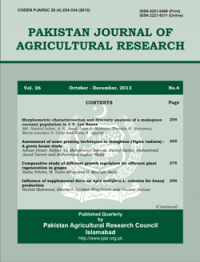Effect of Different Irrigation Sources on Proximate Composition and Heavy Metals Uptake in Some Selected Vegetables
Effect of Different Irrigation Sources on Proximate Composition and Heavy Metals Uptake in Some Selected Vegetables
Safina Naz1, Muhammad Akbar Anjum1, Saeed Akhtar2, Syed Atif Hasan Naqvi3* and Muhammad Asif Zulfiqar4
ABSTRACT
Polluted soils due to prolonged irrigated by f waste water are a reason of accumulation of heavy metals leads to the production of contaminated food which exerts serious health risks to the humans. In the present study, edible portions of five vegetables viz., okra, tomato, spinach, carrot and cauliflower, grown with canal, tubewell and sewage irrigation water, were assessed for their proximate (moisture, ash, protein and fiber) and heavy metal (Pb, Ni, Cu, Cd, Fe and Cr) contents. Significant differences were found for proximate composition of canal, tubewell and sewage water irrigated vegetables. The vegetables grown with tubewell water had higher moisture, ash and fiber contents compared with those grown with canal and sewage water; whereas protein content detected was higher in okra, tomato and spinach irrigated with sewage water and in carrot and cauliflower grown with tubewell water. Significant variations were also recorded in heavy metal (Pb, Ni, Cu, Cd, Fe and Cr) contents of these vegetables grown with different sources of irrigation water. The vegetables irrigated with sewage water had greater concentrations of these metals, which were higher than the safe limits recommended by WHO (1996). All the vegetables grown with tubewell water had significantly lower heavy metal contents, well below the critical limits. The concentration of Pb in tomato and cauliflower, Cd in tomato and spinach, and Fe in spinach irrigated with canal water were also detected beyond the safe limits. The study concludes that the continuous use of sewage water deteriorates or lowers the quality and increases heavy metal contents of vegetables.
To share on other social networks, click on any share button. What are these?






